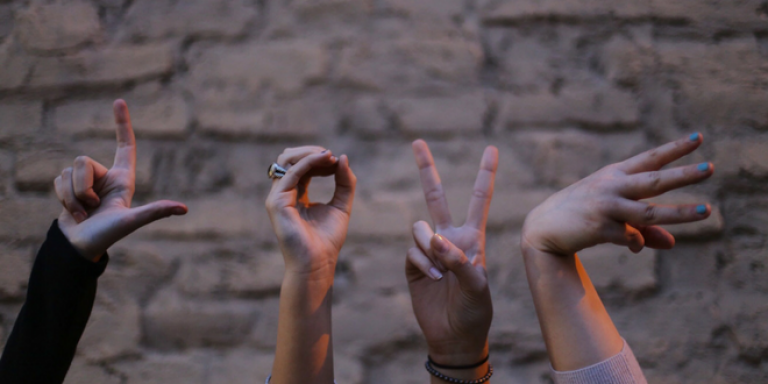7 ways you can be a better LGBTQ+ ally
5 December 2020
Allies can be some of the most effective and powerful voices of the LGBTQ+ movement. In this article, you can find some of the ways you can be a better LGBTQ+ ally!

Many LGBTQ+ people come out for the first time when they come to university. Learning that someone you care about is LGBTQ+ can open up a range of emotions and it may be difficult to know how best to react and support them. The important thing to remember is that if someone comes out to you - whether directly or indirectly - they are telling you that you are someone they value and that they want to be genuine and honest with you.
Coming out is a very personal experience, and the support needed will look different for each individual. There is no one right way to be a great ally, but here are some ways in which you can become a more supportive friend, loved one, or colleague.
1. Be open to learn, listen and educate yourself
Part of being supportive to your LGBTQ+ friends and loved ones means developing a true understanding of how the world views and treats them. It sounds obvious, but to learn, you need to be willing and open to truly listen. Listen to your friend's personal stories and ask questions respectfully. Take it upon yourself to learn about LGBTQ+ history, terminology, and the struggles that the community still faces today. Sure, your friend may be happy to answer your questions but they are not a walking LGBTQ+ encyclopaedia! The Internet is a wonderful resource in this instance.
2. Check your privilege
Most of us (including those of us within the LGBTQ+ community) have some type of privilege - whether it's racial, class, education, being cis-gendered, able-bodied or straight. Being privileged doesn't mean that you have not had your fair share of struggles in life. It just means that there are some things you won't ever have to think or worry about just because of the way you were born. Understanding your own privileges can help you empathise with marginalised or oppressed groups.
3. Don't assume
Don't assume that all of your friends, co-workers, and even housemates are straight. Don't assume someone's gender or pronouns. LGBTQ+ people don't look a particular way and someone's current or previous partner(s) doesn't define their sexuality (yes, bisexuals, pansexuals and queer people exist!) Someone close to you could be looking for support - not making assumptions will give them the space they need to be their authentic self and open up to you in their own time.
4. Think of 'ally' as an action rather than a label
It is easy to call yourself an ally, but the label alone isn't enough. Oppression doesn't take breaks. To be an effective ally you need to be willing to be consistent in your support of LGBTQ+ rights and defend LGBTQ+ people against discrimination. Anti-LGBTQ+ comments and jokes are harmful - let your friends, family and co-workers know that as an ally you find them offensive. It takes all members of society to make true acceptance and respect happen and your open and consistent support will hopefully lead as an example to others.
5. Confront your own prejudices and unconscious bias
Being an ally means you will often find that you need to challenge any bias, stereotypes, and assumptions you didn't realise you had. Think about the jokes you make, the pronouns you use and if you wrongly assume someone's partner is of a particular sex or gender just because of the way they look and act. LGBTQ+ prejudices can be subtle and transphobia and biphobia exist even within the LGBTQ+ community. Being a better ally means being open to the idea of being wrong sometimes and being willing to work on it.
6. Know that language matters
We form human connections through language. The majority of us respect when someone changes their nickname – accommodating LGBTQ+ people’s names and pronouns are no different. If you are unsure of someone’s pronoun or label, just ask them respectfully. When meeting new people try integrating inclusive language into your regular conversations by using gender neutral terms such as ‘partner’ and keep an eye on any unintentionally offensive language you may use everyday.
7. Know that you will mess up sometimes – breathe, apologise, and ask for guidance
Accidentally assumed someone’s label? Having a conversation about someone who is trans or non-binary, and unintentionally used the wrong pronoun? It happens - don’t panic, apologise, and correct yourself with something along the lines of: "I’m sorry, that wasn’t the word I meant to use. I’m trying to be a better ally and learn the right terminology, but I’m still working on it. If you hear me misuse something, I’d really appreciate if you could let me know." Likely, the person you are talking to will know that this process of unlearning is new to you and will appreciate your honesty and effort!
Become a friend of Out@UCL and the LGBTQ+ Network!
You can show your support for UCL’s LGBTQ+ students and staff by becoming a friend of Out@UCL and the LGBTQ+ Network, our networks for staff and students respectively.
Out@UCL wish to create an inclusive environment where LGBTQ+ staff, students, and visitors can be themselves, which includes feeling comfortable enough to be out. By becoming a friend of Out@UCL you’re agreeing to be an active ally, visibly displaying your support using our ‘Friend of Out@UCL’ stickers (i.e. on your laptop!) which are available by emailing equalities@ucl.ac.uk.
Your commitment will help to make UCL a safer, more supportive and inclusive place to work and study for all, so for this, thank you for being an ally!
Last revised: 8 September 2021
Nichola Carroll, UCL alumna, BA Modern Languages
 Close
Close

